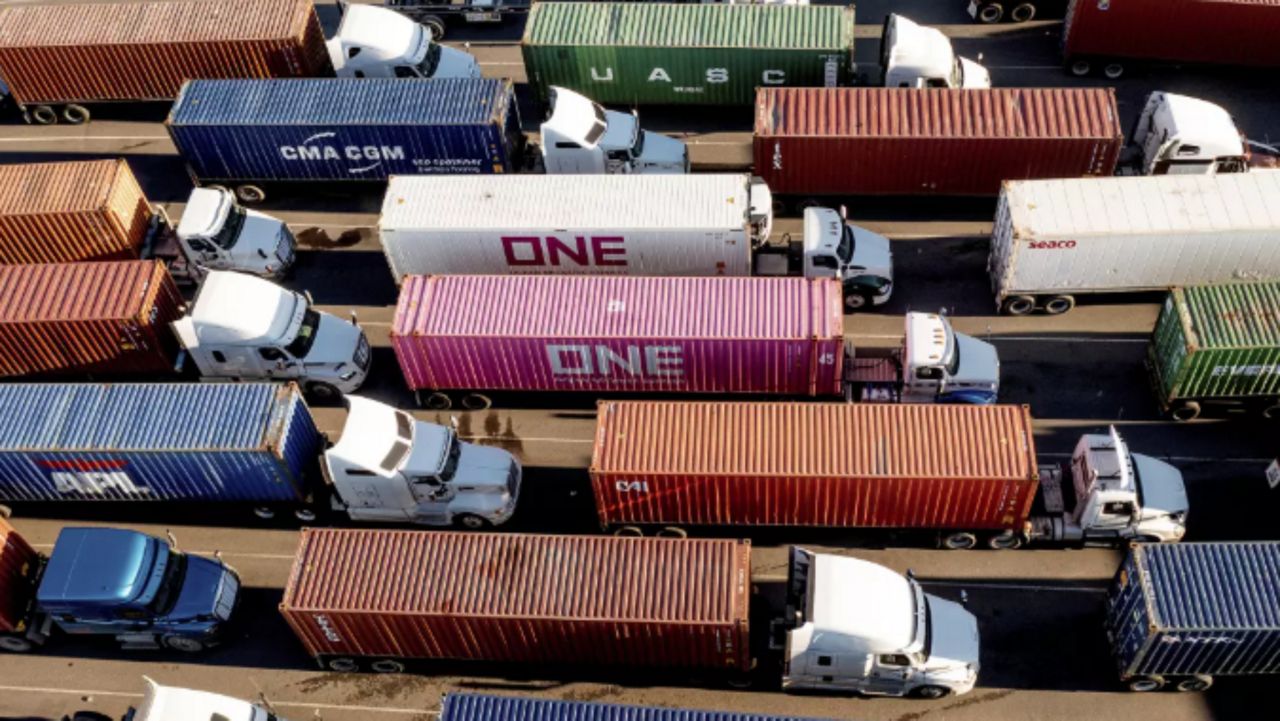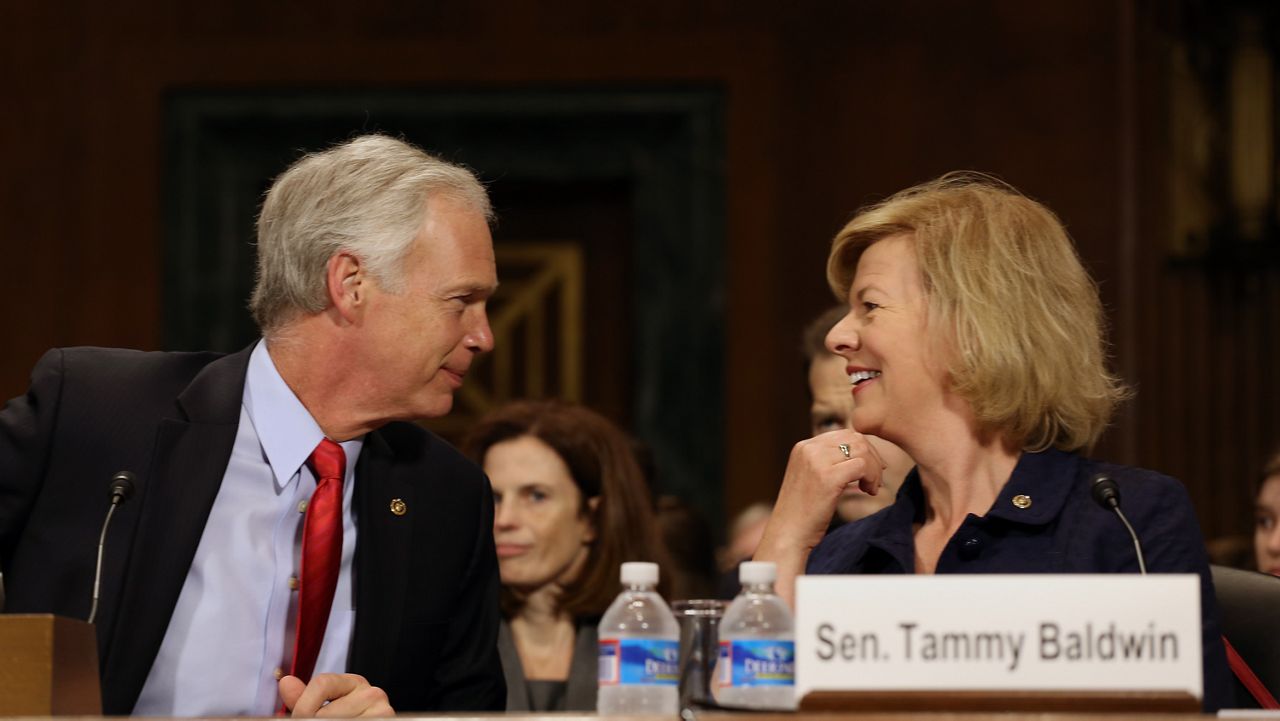WISCONSIN — President Donald Trump this week unveiled new sweeping tariffs on nations across the globe, setting a 10% baseline on all imports.
He also imposed a higher individual rate on dozens of countries where the U.S. has a deficit on trade.
Wisconsin Economic Development Corporation (WEDC) data shows a clear picture of just how much Wisconsin imports from other countries, with heavy reliance on industrial and electrical machinery and things like pharmaceuticals. Imports to Wisconsin last year totaled more than $38 billion.
When broken down by product, the state imported over $8 billion in industrial machinery last year, $4.86 in electrical machinery, $4.69 billion in pharmaceutical products and $3.09 billion in vehicles and parts.
But it’s not just imports that will be affected. Retaliatory tariffs introduced by other countries could mean Wisconsin will have a bigger price tag on exports too. In 2024, the state exported a total of over $27 billion worth of products to 201 countries and customs territories, WEDC data shows, with the largest product categories nearly mirroring imports.
It’s unclear what effects these new tariffs will have on costs for these items, but WEDC Secretary and CEO Missy Hughes said some Wisconsin businesses have already expressed worry over what might happen. She said she expects businesses to slow down from taking any risks, such as hiring new people.
An area that Hughes said may face a significant challenge are companies importing coffee because there’s really no way to find a source that’s from within the U.S.
Some, such as in the scrap metal industry, may be poised to benefit from the tariffs.
Included in the countries that have a trade deficit with the U.S. is China, which will see a 34% tariff under the new plan, according to charts shared by the White House. China was quick to introduce a retaliatory tariff of 34% on all U.S. imported goods starting on April 10.
Wisconsin received the most amount of imported goods from China last year, according to WEDC data. Shipments totaled $6.4 billion last year, which was an increase of 16.5% from 2023.
Industrial machinery was the top product Wisconsin imported from China, making up 26.8% of those total imports. Following that was electrical machinery and medical and scientific instruments.
Wisconsin also exported $1.5 billion to the country last year, the third largest destination for the state’s exports. Medical and scientific instruments were the top export to China, something Hughs said is concerning.
“We’re concerned about that, but really the tariffs are so sweeping that at this point, not only are we concerned about the impacts of the tariff on particular companies, but we’re also very concerned about the potential for a recession or a downturn, and the impact that that will have on every company, regardless of imports or exports,” Hughes said.
Under the new tariffs, Canada and Mexico are not facing higher rates than what is already being charged by Trump: a 25% tariff on auto imports and aluminum and steel.
Canada was Wisconsin’s second highest source of imports in 2024, with a total of $6.2 billion. Like China, industrial machinery was also a top product, but Wisconsin also relied on plastic products, mineral fuel/oil, paper products and articles of wood from Canada. The country was Wisconsin’s number one destination for exports, with over $7.9 billion worth of products traveling there.
Mexico took the third highest spot for imports, with vehicles and parts becoming the top product category, at $2 billion. The country is the second highest for Wisconsin’s exports, at over $4 billion last year.
Wisconsin also imported large amounts of pharmaceuticals from Ireland. Vietnam, Germany, India, Taiwan, Italy and Belgium were also within the top 10 imports in Wisconsin for 2024. All of these are included in Trump’s reciprocal tariffs. The European Union faces a 20% tariff, Vietnam a 46% one, India a 26% one and Taiwan a 32% one.
At the same time as the tariffs were announced, Gov. Tony Evers launched a trade and investment mission to Europe, with stops in Hannover, Hessen and Berlin in Germany, and the Bourgogne-Franche-Comté region in France.
The goal is to connect companies to other countries and help them explore different markets. This trade mission also kicks off the 50th anniversary of Wisconsin’s sister-state relationship with Hessen, Germany.
Though it’s been a trip that has been months in the making, Hughes said it’s come at a good time.
“When you have the opportunity to come and see someone who you’ve been friends with for 50 years, and you’re in a moment of a tug of war, it’s really nice, and it’s been really, really meaningful to everybody that we’re here as Wisconsin, extending our partnership to our friends in Germany and our friends in France,” she said.
In a statement before leaving, Evers echoed these thoughts.
“During a time of global trade uncertainty and chaos and trade wars out of Washington, maintaining our strong relationships with our global partners has never been more important to ensure continuity and certainty for our local businesses, regional economies, and communities. I am excited to continue building and growing these critical connections and relationships with our partners to ensure the continued growth of Wisconsin’s economy,” said Evers in the release.

Hughes said as they’ve been there, officials from Germany and France have expressed disappointment with the current situation.
“That’s been really difficult to hear,” she said. “Folks have really relied on the friendship of the United States for a very, very long time, and it’s hard to see that in this moment of real challenge.”
Hughes said WEDC is doing all they can to educate businesses on the tariffs, including finding areas for exemptions. She said WEDC will also be exploring other markets to see if there are opportunities for Wisconsin businesses to jump at given the current import and export limitations.
Ultimately, Hughes said there will be some concern over the unpredictability of whether tariffs will stick.
“Businesses can plan for difficult times, right? If businesses know there’s going to be a supply chain problem in the future, they can plan for that. If they know that they have workforce challenges, they can plan for that. But real crisis, which is really what — and this is a man-made crisis — it’s very hard for businesses to plan for this, and so that makes them very concerned for the future,” she said.










